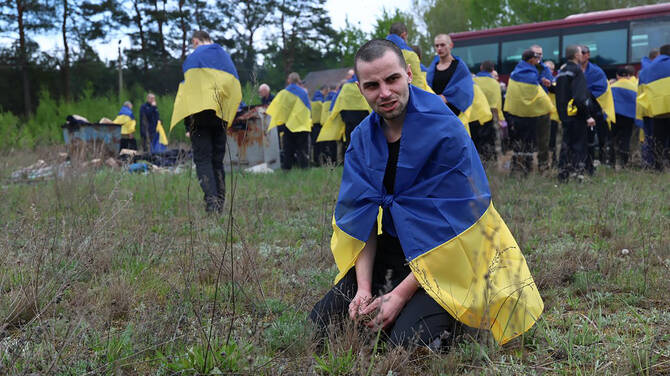London: UK Royal Navy vessels are unable to attack Houthi positions in Yemen because they lack the necessary missiles, it has been revealed, in what one former defense chief called a “scandal.”
Britain has joined America in conducting operations against the Houthis in a bid to halt attacks on commercial shipping in the Red Sea, but the US Navy has had to carry out the majority of strikes on the Yemeni mainland, the Daily Telegraph reported.
A UK defense source told the newspaper that HMS Diamond, the Royal Navy destroyer stationed in the Red Sea, lacks “the capability to fire to land targets,” meaning the UK’s sole source of offensive capability comes from Royal Air Force jets stationed at RAF Akrotiri in Cyprus, around 1,500 miles away.
HMS Diamond, the source said, has instead been involved in downing “Houthi drones targeting shipping in the Red Sea,” with the only functioning weapons systems on UK destroyers being fixed artillery guns.
US Navy destroyers, meanwhile, have the capacity to fire Tomahawk guided missiles, with a range of 1,500 miles.
A former senior defense chief told the Daily Telegraph: “It’s clearly a scandal and completely unsatisfactory. This is what happens when the Royal Navy is forced to make crucial decisions which can affect capability.
“The UK is now having to fly RAF jets thousands of miles to do the job of what a surface-to-surface missile can do.”
Admiral Sir Tony Radakin, head of the UK Armed Forces, warned the government of the need to “speed up our acquisition processes” for “land attack missile systems” on British vessels five years ago when he was head of the Royal Navy.
Since then, a temporary system of Norwegian-made Naval Strike missiles has been installed on just one UK vessel, and has yet to be tested. A new cruise missile system for British warships is due to be introduced in 2028.
Conservative MP Mark Francois, a former armed forces minister, told the Daily Telegraph: “The lack of a land attack missile from the Royal Navy’s surface fleet was specifically highlighted in a defence committee report some two years ago.
“It is encouraging that this missile is now on order but also disappointing that it is still not yet in operational service.”
Earlier this year, US Navy Secretary Carlos Del Toro warned that Royal Navy investment is “significantly important” given “the near-term threats to the UK and US.”
The former chair of the House of Commons Defence Select Committee, Tobias Ellwood, urged Defense Secretary Grant Shapps to review the situation.
“We can’t continue to do this with a surface fleet that’s too small and cannot fire on land at range,” Ellwood said.
On Saturday, Shapps said: “It is our duty to protect freedom of navigation in the Red Sea and we remain as committed to that cause as ever.”
A spokesman for the UK Ministry of Defence said in a statement: “As with all coalition operations, commanders select the best equipment for the job. HMS Diamond is an air defence destroyer, which has been directly involved in successfully destroying Houthi drones targeting shipping in the Red Sea.
“Equally, the Royal Air Force has the capability to strike land targets with high precision, which is why Typhoon aircraft strikes have reduced the Houthis ability to conduct these attacks.”



























